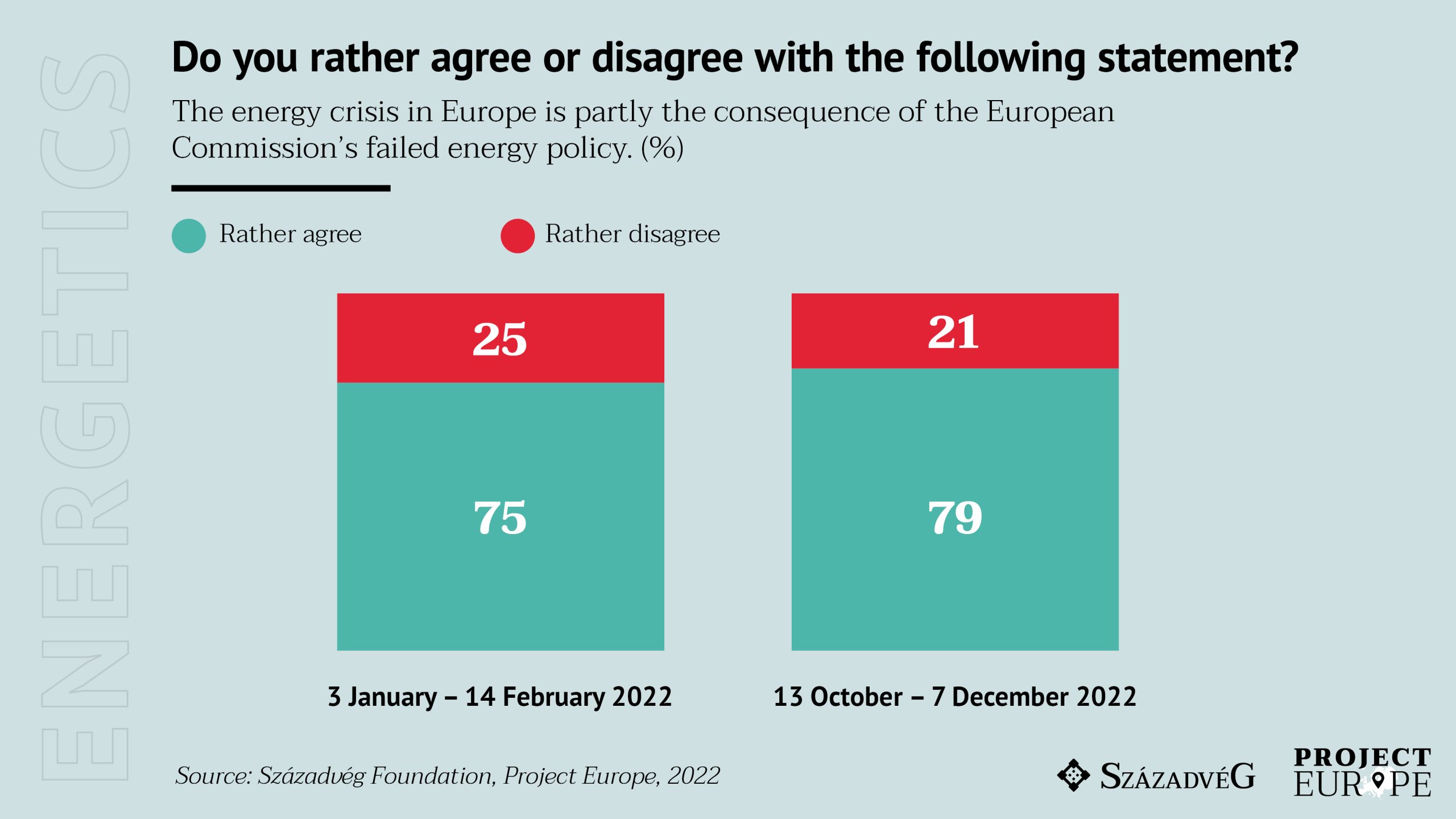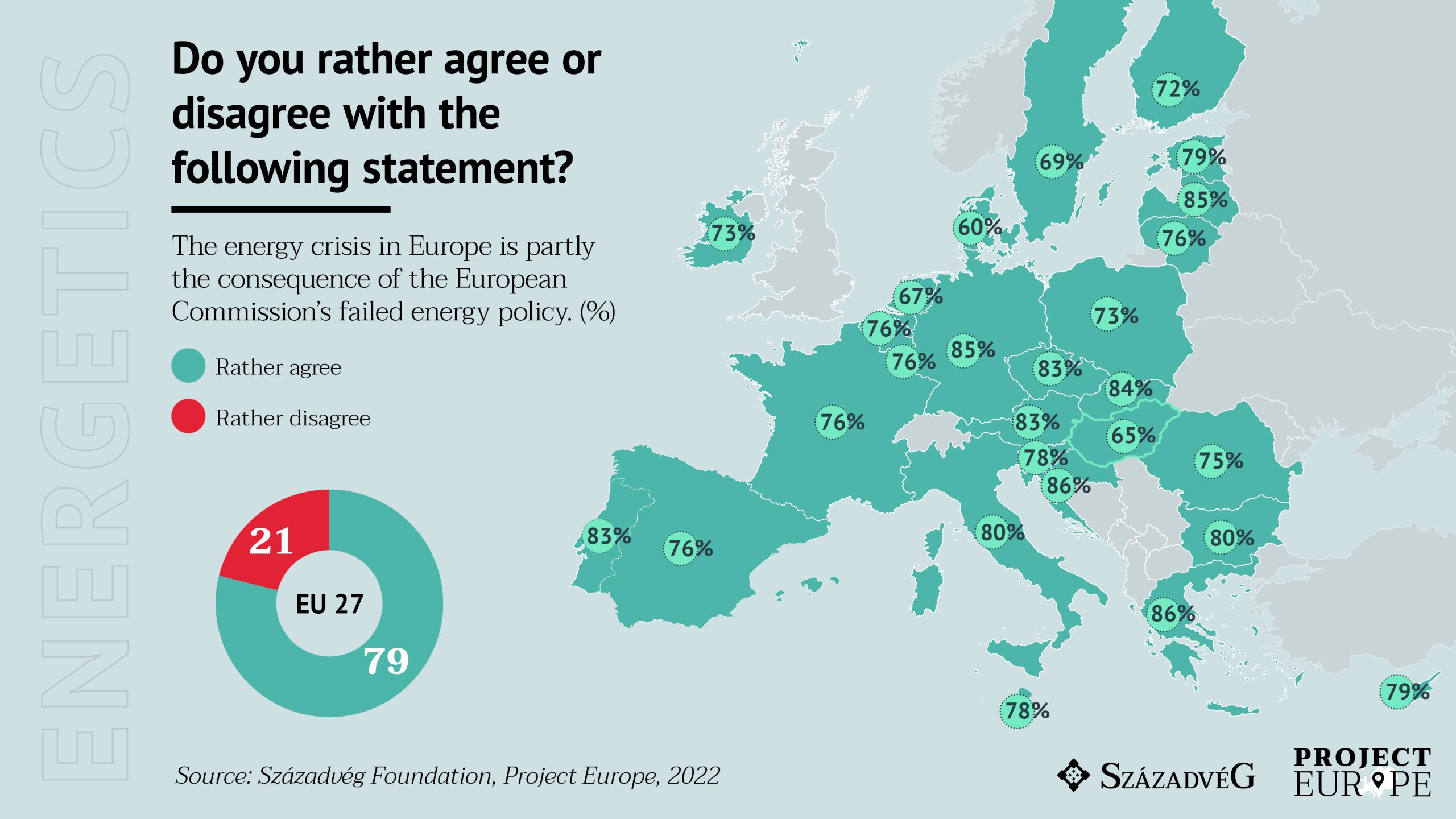Already after the first major increase in energy prices in the autumn of 2021, many experts suggested that the structural problems of the European energy market are largely the result of the ideology-driven Brussels policy. At the time, representatives of the European Commission argued that the criticisms were unfounded, the price increase was only temporary, and the ambitions aimed at the extreme transformation of the energy system should be stepped up. After the outbreak of war, Brussels focused its energy policy on sanctioning Russian energy sources, further narrowing Europe’s room for manoeuvre in the energy market, while maintaining its previous ambitions. Like in the case of the pre-war Europe Project Research, which took place between 3 January and 14 February 2022, during the survey between 13 October and 7 December 2022 Századvég assessed how much of the adult population in Europe considers Brussels efforts to be responsible for the European energy crisis.
Since the introduction of sanctions, rejection of Brussels energy policy in Europe has increased
The results of pre-war research have already shown that the European Commission’s argument that their previous energy policy ambitions need to be stepped up is not in accordance with the opinion of European citizens. Based on the results of the 2022 winter data collection, three-quarters of those who responded held the Commission’s policy responsible for the energy crisis.
Europeans’ dissatisfaction has been further increased by Brussels’ sanctions policy and the resulting rise in prices. In the 2022 autumn survey, almost four-fifths (79 percent) of respondents said that the European Commission’s failed energy policy was partly responsible for the situation.
A majority in all Member States agrees with the responsibility of Brussels
Greeks, Croatians, and Germans are least divided by the issue; 86, 86 and 85 percent of the respondents, respectively, in these countries think Brussels’ efforts are responsible for the energy crisis (the rate increased in all three countries throughout the period considered). The case of Germany is particularly interesting because the fundamentals of the European Commission’s previous – pre-war – energy policy were largely in line with German measures.
Danish respondents (60-40 percent), Hungarian respondents (65-35 percent), and Dutch respondents (67-33 percent) are most divided by Brussels’ responsibility. (The proportion of those who agreed increased slightly in Denmark and Hungary throughout the period considered but decreased in the Netherlands.) Based on previous analyses, the results for Denmark and the Netherlands can be explained by higher public support for sanctions. In Hungary, the lower relative ratio is probably due to the fact that, thanks to government measures, the population is less exposed to the negative effects of the sanctions than citizens of other European countries.
In the first half of 2016, the Századvég Foundation conducted a public opinion poll survey covering all 28 European Union Member States, with the aim to analyse the opinions of EU citizens regarding the issues that most affect the future of the EU. In a unique way, Project 28 conducted the widest possible survey of 1,000, that is a total of 28,000 randomly selected adults in each country. Gaining an understanding of society’s sense of prosperity and mapping the population’s attitudes towards the performance of the European Union, the migration crisis and the increasing terrorism were among the most important goals of the analysis. Following the surveys in 2017, 2018 and 2019, on behalf of the government, the Századvég Foundation has been conducting the research under the name of Project Europe since 2020, which continued to reflect on the topics that most dominated the European political and social discourse.
In 2022, the aim of the survey is again to map the population’s attitude towards the most important public issues affecting our continent. In addition to society’s sense of prosperity, the performance of the European Union, the coronavirus pandemic, climate change, and the perception of the migration crisis, in line with the latest challenges affecting Europe, the dominant theme of this year’s poll has been the Russian-Ukrainian war, the energy crisis, energy supply, and family policy. In addition to the European Union Member States, the 2022 research covered the United Kingdom, Norway, Switzerland, Moldova, Albania, Kosovo, North Macedonia, Montenegro, Serbia, Turkey, and Bosnia and Herzegovina, and surveyed a total of 38,000 randomly selected adults using the CATI method between 13 October and 7 December.


